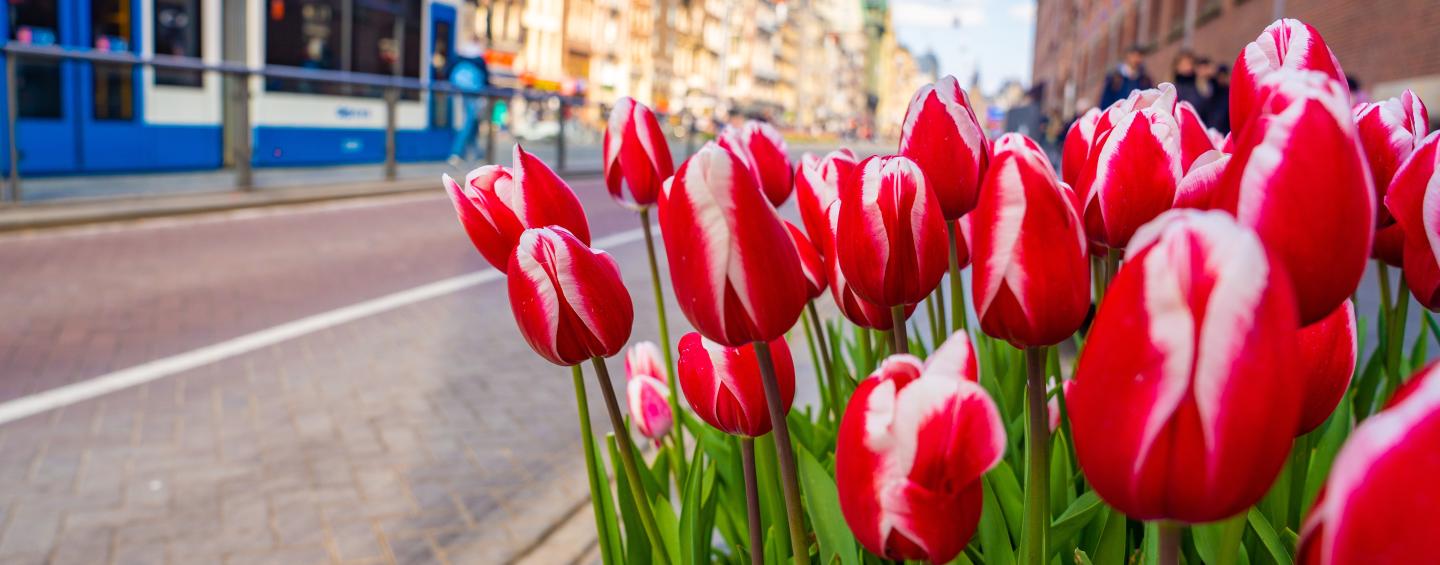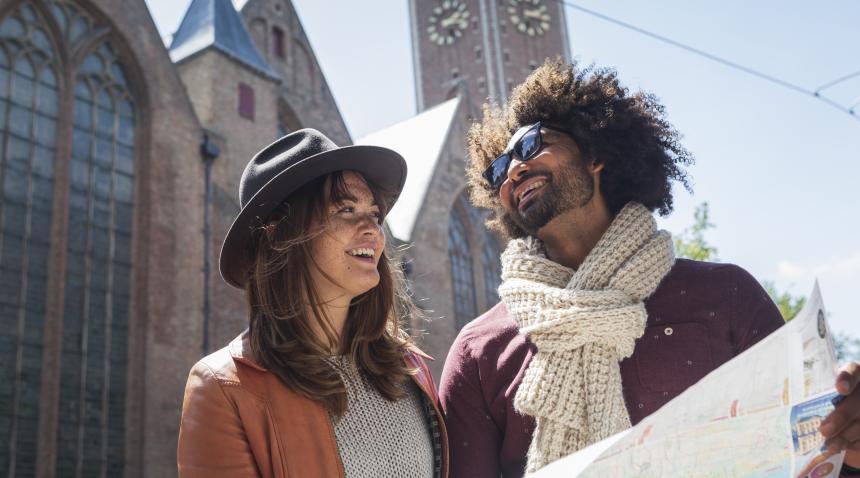
Important dates and holidays in 2025
The start of 2025 means there’s a whole year of important events and holidays to look ahead to. It’s important to keep in mind what these dates mean for you, as some are, and some are not official public holidays.
Here's a list of important dates on the Dutch calendar you should take note of, many of which you will receive time off work for:
| Important dates | 2025 |
| Nieuwjaarsdag (New Year’s Day) | 1 January |
| Goede Vrijdag (Good Friday) | 18 April* |
| Eerste Paasdag (Easter Sunday) | 20 April |
| Tweede Paasdag (Easter Monday) | 21 April |
| Koningsdag (King’s Day) | 26 April |
| Nationale Dodenherdenking (Remembrance Day) | 4 May* |
| Bevrijdingsdag (Liberation Day) | 5 May** |
| Hemelvaartsdag (Ascension Day) | 29 May |
| Eerste Pinksterdag (Whit Sunday) | 8 June |
| Tweede Pinksterdag (Whit Monday) | 9 June |
| Sinterklaas | 5 December* |
| Eerste Kerstdag (Christmas Day) | 25 December |
| Tweede Kerstdag (Boxing Day) | 26 December |
| Oudejaarsavond (New Year's Eve) | 31 December* |
*This is not an official holiday for everyone. Contact your local HR department to inform if this is a day off work for you.
**This is only an official holiday once every 5 years; it is a holiday again in 2025.
If you wish to learn more about national holidays, or to check the holidays for 2026, please visit the official website of the Dutch government.
Dutch school holidays
The Ministerie van Onderwijs, Cultuur en Wetenschap – OCW (Ministry of Education, Culture and Science) fixes the dates of the main school holidays and gives advisory dates for spring and autumn holidays. Please find the official school holidays on the official website of the Dutch government.
Dutch holidays explained
New Year’s Day
Just like in many other countries in the world, New Year’s Eve is a huge celebration in the Netherlands. The Dutch have their very own traditions during this evening: They like to eat a lot of oliebollen (a traditional Dutch pastry: deep-fried dough balls with or without raisins) and watch beautiful fireworks when the clock strikes 12. You can also join the fun by lighting up fireworks of your own, as you are allowed to buy them; just be safe and aware of any rules and regulations regarding their sale and usage.
If you are really brave and want to start the new year fresh, you can always join one of the many New Year swims on 1 January, with the most famous of all being the one in Scheveningen. Each year thousands of people participate in this Nieuwjaarsduik.
Easter
Easter is a real family event in the Netherlands. The Dutch typically have a lovely Easter breakfast or brunch together to start the day. Afterwards, kids will paint Easter eggs and participate in a treasure hunt - searching for them throughout the garden, whilst the grown-ups can be found enjoying each other’s company. If you are interested in attending an event during the Easter period, you can attend a classical music concert with a beautiful performance of the Matthäus Passion. If that's not your style, the popular Paaspop festival features musical acts of varying genres from all over the world. Or for a closer-to-home feel, you can always spend some time strolling past the many stands at one of the Easter markets throughout the city.
King’s Day
One of the most famous Dutch festivities is King’s Day: The day in which the country celebrates the King’s birthday on 27 April. n 2025, King’s Day will be celebrated a day earlier on Saturday 26 April, because 27 April falls on a Sunday. Be sure to hang out your Dutch flag and dress in one of the Dutchies favourite colors - orange. The streets are filled with music, dancing, celebration and to go on along with it, there are a lot of activities and events throughout the city. Street markets everywhere; with people selling their old and new goods and home-made treats. Bands are playing on every street corner and every pub is serving beer outside, while cafes often extend to the street too. There's usually some music festivals across the country - including The Life I Live music festival in The Hague. Tradition dictates that the Royal family visits 1 or 2 municipalities in the country on this day, so with any luck, you might see them yourself.
The Hague is to place to be if you are looking for something to do on the night before King’s Day, because there's also King’s Night! On this night, well-known bands and DJ’s perform on the various squares in The Hague to get you truly in the celebratory spirit.
Remembrance Day
The Dutch find it very important to commemorate World War II. Therefore, they remember all the victims of World War II (and other wars) on 4 May - Nationale Dodenherdenkingsdag (Remembrance Day). They celebrate being liberated the day after on May 5, known as Bevrijdingsdag (Liberation Day).
Remembrance Day began as a memorial day specifically for those killed in World War II, but since 1961 it has also included victims of other military conflicts and peacekeeping missions. The main ceremony on the Dam in Amsterdam is attended by the Dutch royal family and military leaders and veterans, with speeches and a flower-laying ceremony. In The Hague, the memorial service takes place at the Waalsdorpervlakte, a remembrance ground for fallen resistance fighters. Keep in mind, there's a 2-minute silence at 20.00 hrs every year and public transport and other traffic stop at this time. The services at the Dam and Waalsdorpervlakte are broadcasted live on TV.
Liberation Day
Every 5th of May, the Netherlands marks the end of Nazi Germany's occupation during World War II with a range of events and celebrations on Liberation Day. It is only a public holiday every 5 years (the next being in 2025), which means that in the other years, you will not get a day off.
On Liberation Day, you should consider visiting one of the many Liberation Festivals taking place across the country. Throughout the country, Dutch bands, international musicians and DJs will perform live - The Hague has its own too; Bevrijdingsfestival. You can also attend other Liberation Day events, such as military parades, debates, street theatre performances, festival markets, guided tours, film screenings and even events where people can speak to veterans about their stories and experiences from the war.
Sinterklaas
In mid-November, two weeks before December 5, Sinterklaas arrives in the Netherlands by boat from his home in Spain. This is a big event for many Dutch families, and kids help to warmly welcome Sinterklaas during his arrival (intocht) with their parents. During these two weeks before his 'birthday', Sinterklaas rides across rooftops at night on his white horse, listening through chimneys for good children. It is tradition that children put out their shoe at night with a carrot for the horse hoping to find the shoes next morning filled with a small gift and/or sweets.
On December 5, Sinterklaas ends with Pakjesavond (Gifts Evening). On Pakjesavond, children anxiously wait for Sinterklaas to knock on their door. Although Sint will usually have flown by the time they answer, a sack full of gifts will await them on their doorstep. Following Sinterklaas' visit, each member of the family takes turns handing out presents and unwrapping them. For the elder ones, every present is accompanied by a humorous poem about the gift's receiver, sometimes teasing them about their good and bad habits. December 5 is not a public holiday.
Christmas
Dutch Christmas consists of 2 days: Eerste Kerstdag (Christmas Day) and Tweede Kerstdag (Boxing Day). The celebration is typified by family gatherings, during which delicious food and drinks are served. Some Dutch families also give each other presents. Dutch streets and homes are filled with Christmas trees, lights and other decorations. In some cities, Christmas markets serve hot chocolate and mulled wine and sell winter themed gifts, art and antiques - including our own Royal Christmas Fair The Hague which takes place at the end of each year.



